Duke Surgery's 10th Annual Research Day will be held on April 22, 2026.

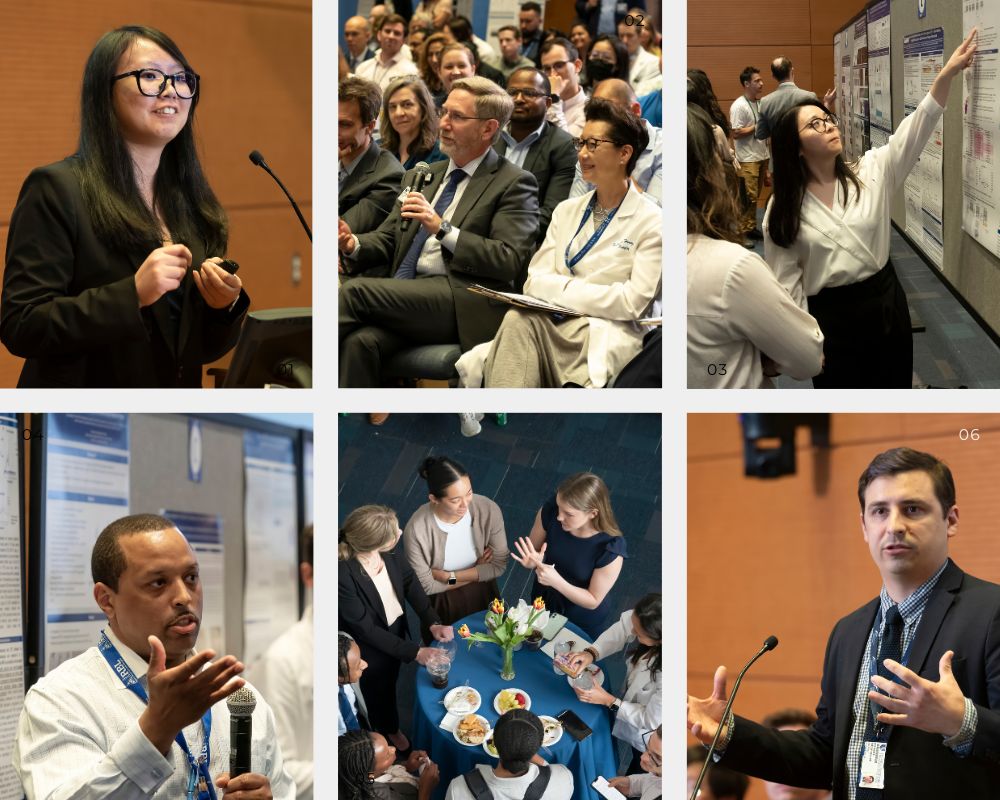
2026 Program Directors
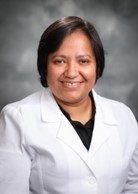

Agenda
Abstracts
Deadline
Abstracts must be submitted by February 4, 2026 SUBMISSION DEADLINE EXTENDED TO 2/6/26!
Eligibility
Learners in the Duke Department of Surgery or Duke NUS are encouraged to submit an abstract highlighting innovation and research fostered among departmental trainees. Eligible learners include fellows (MD or PhD), residents, graduate students, medical students, and undergraduate students working in a lab and/or contributing to research within the Department of Surgery. Also included is any individual engaged in their first two years of postdoctoral training; however, those who have completed postdoctoral training and are eligible for a faculty position are NOT eligible to participate as first author on an abstract.
NOTE: It is required that the learner’s primary mentor is affiliated with a lab or other research within the Duke Department of Surgery or Duke NUS.
The first author of the abstract submitted is required to be the presenting author. The first author is expected to attend in person on Research Day, April 22, 2026, to answer questions during poster review sessions and, if selected as a podium presenter, to present their research.
Employees of Duke, the Department of Surgery, or Duke NUS are not eligible to participate in Research Day.
Abstracts can focus on basic/translational or clinical research and should state the most applicable category after the title. Learners may only submit one abstract per category (clinical or basic/translational). Research should be recent but may have already been presented and/or published within the past year. Learners must be available to attend Research Day on April 22, 2026.
Format
New for 2026! Please use the new Abstract Submission Form linked below!
The abstract submission file should include two pages: (1) a title page and (2) the abstract including figures or tables. Please use 11-point font and include 1" margins in your file. Submit the title page and abstract in the same file for tracking purposes. Your abstract file must be submitted in PDF format.
Title Page
The title page should list the following information:
- Abstract title
- Clinical or basic/translational research
- Submitter's name (as you would like presented on all materials)
- Submitter’s current status (medical student, resident, postdoctoral fellow/associate, research or clinical fellow, graduate student, pre-med student, undergraduate student)
- Division represented
- All authors with full names and degrees, if available
Abstract
The abstract should be divided into the following sections:
- Background & Hypothesis
- Methods & Results
- Conclusions
Contact
Please contact us with any questions.
Duke Surgery Office of Continuing Medical Education
dukesurgerycme@dm.duke.edu
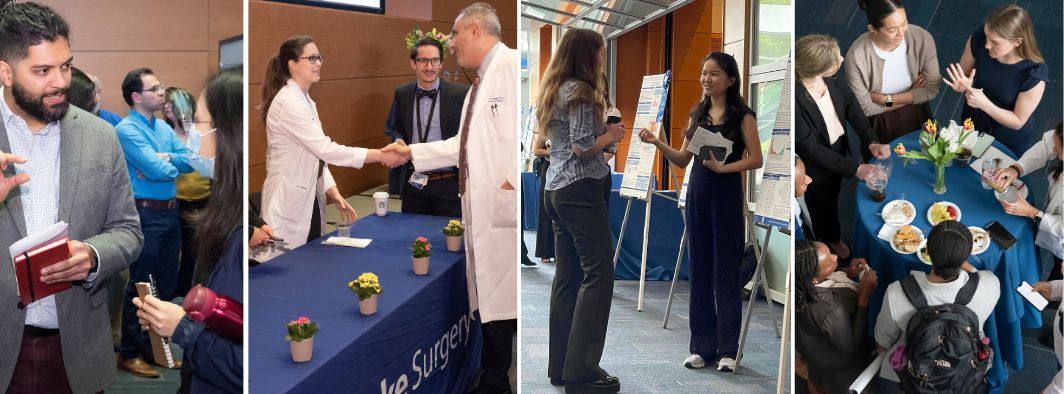
Previous Research Day Winners
Basic Science:
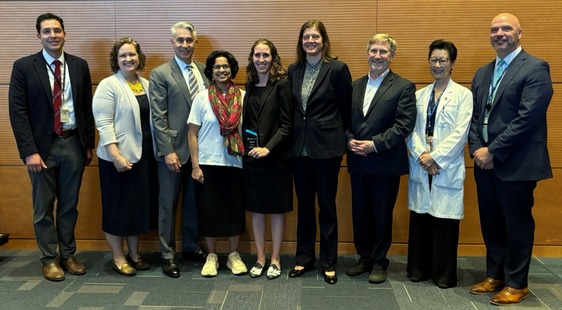
“Immune Recall Responses potentiate antitumor T cell responses to Immune Checkpoint Inhibitor Therapy in patients with Melanoma”
Margaret H. O'Connor, MD, PhD
Mentors: Georgia M. Beasley, MD, MHSc, & Smita K. Nair, PhD
Clinical Science:
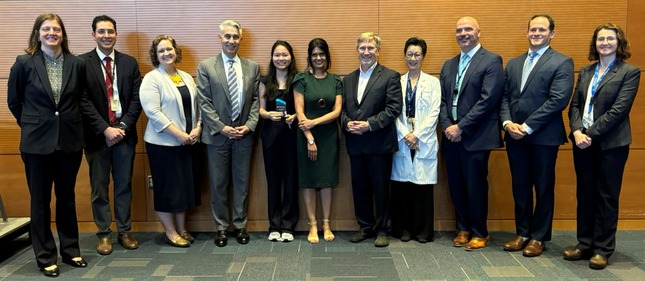
“Heightened Adaptive Stress Response Signaling Drives Aggressive Progression and Treatment Resistance in
Inflammatory Breast Cancer”
Hillary Hsu
Mentor: Gayathri R. Devi, PhD
Basic Science:
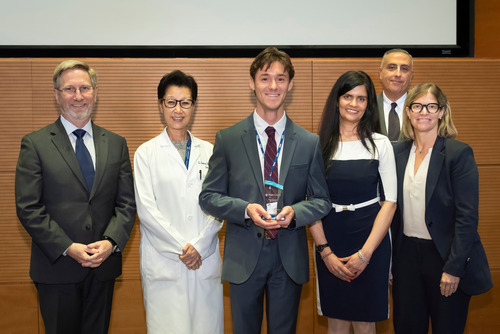
“Rare to Care: Assessing Awareness and Social Drivers of Health in the Primary Care Setting for Improved Diagnosis, Screening, and Management of Inflammatory Breast Cancer”
Beau Blass, BS
Mentor: Gayathri R. Devi, PhD
Clinical Science:
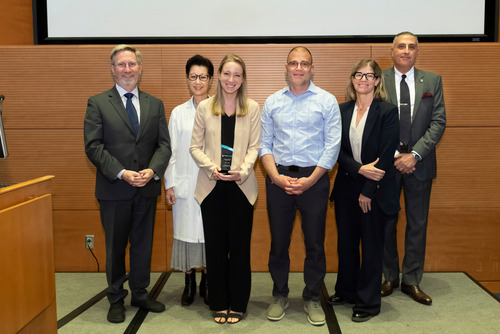
“Chronic viral infections drive CD8 T cells to acquire effector functions that are resistant to immunosuppressive drugs”
Danielle Nettere, BS
Mentor: Justin Pollara, PhD
Basic Science
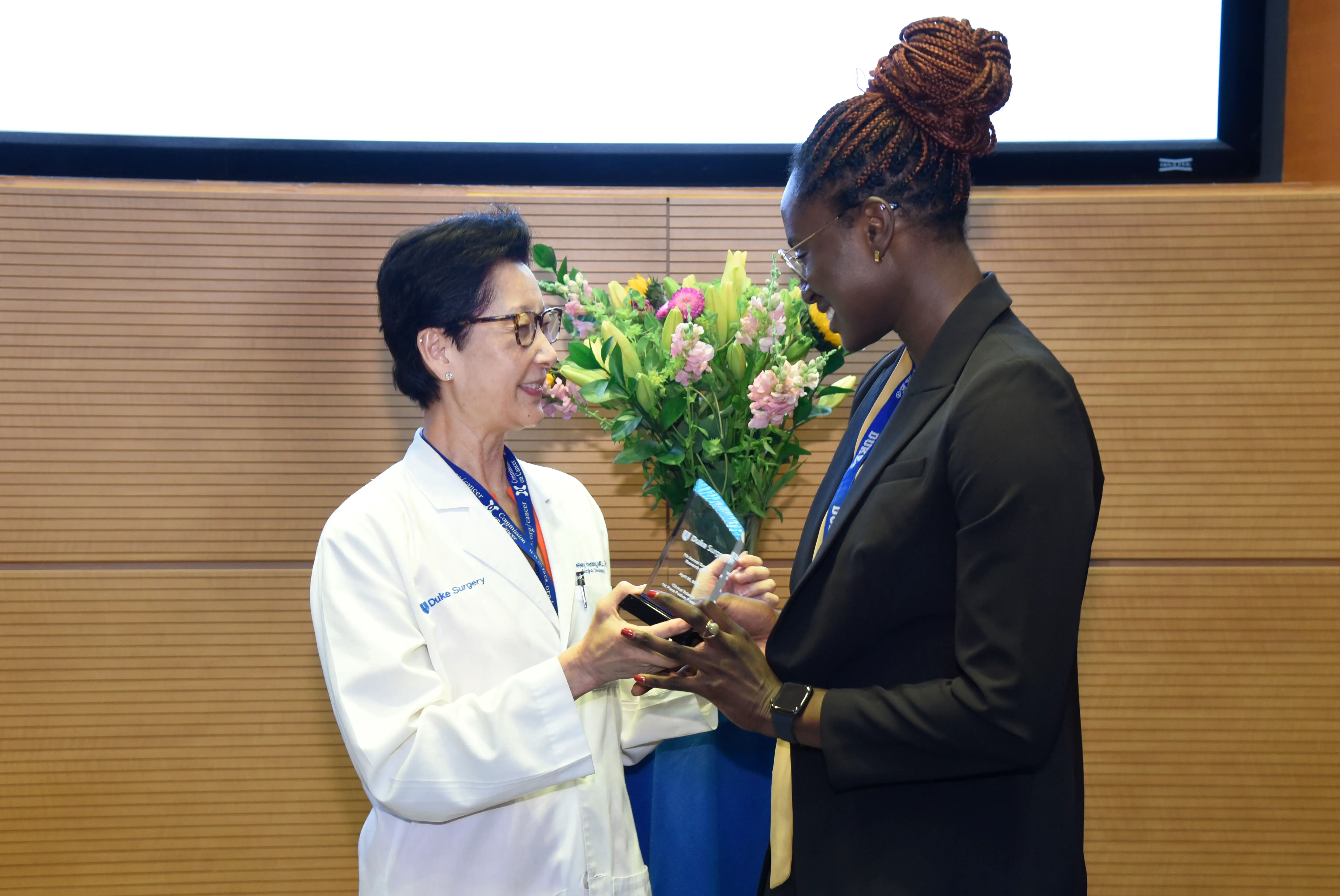
Construction of a Data Pipeline to Facilitate Efficient Access to Social Determinants of Health
Moronke Ogundolie, MS
Mentor: Lisa McElroy, MD
Clinical Science
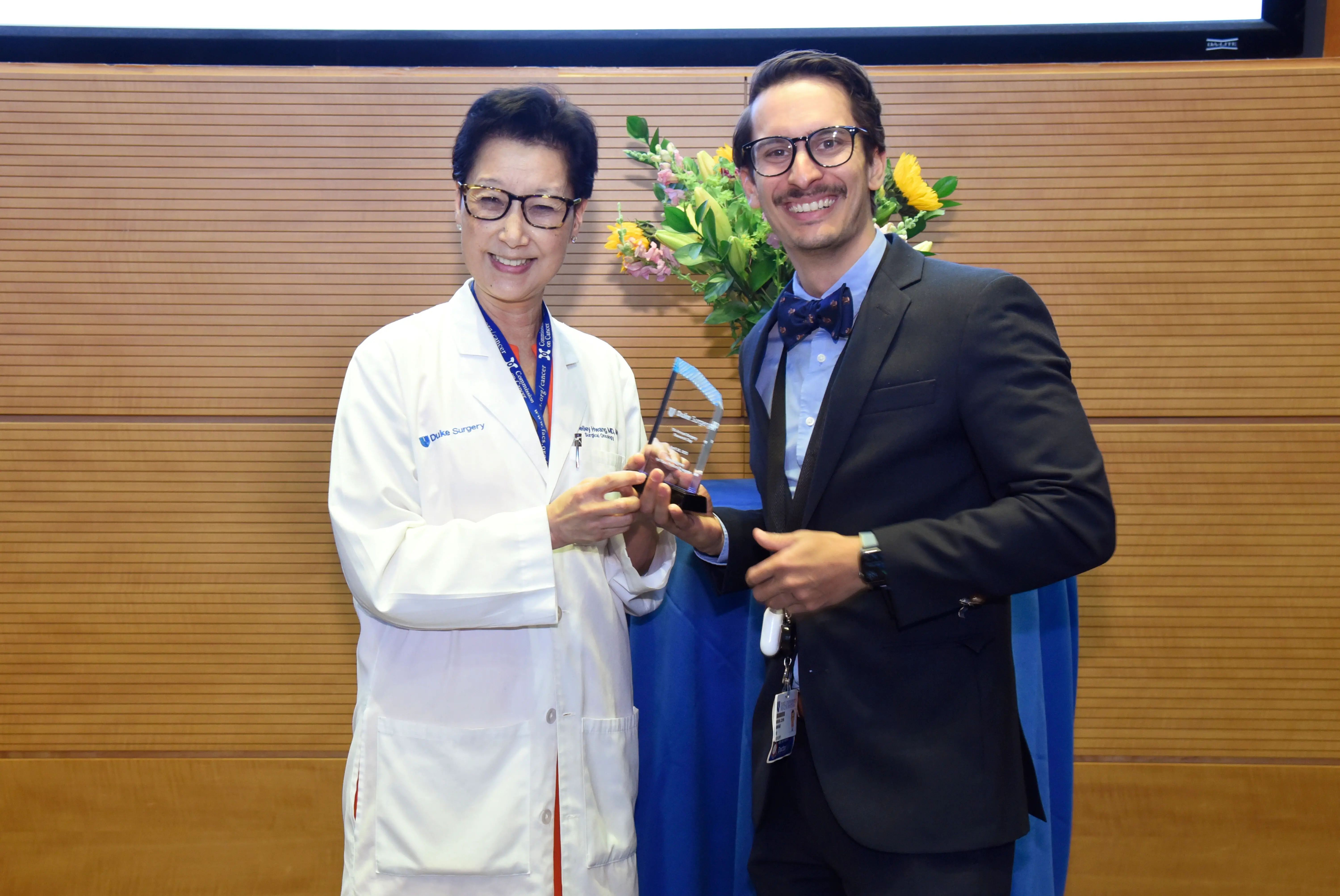
Anti-CD40L-Based Desensitization and Immunosuppression Promotes Long-Term Graft Survival in Allosensitized Nonhuman Primate Kidney Transplantation
Imran Anwar, MD
Mentor: Stuart Knechtle, MD
Basic Research
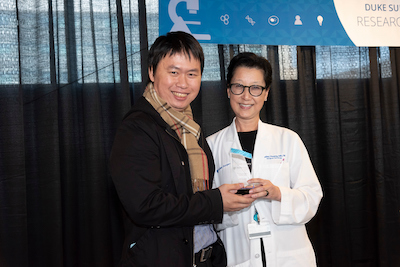
Trastuzumab/Pertuzumab combination therapy stimulates anti-tumor responses through complement-dependent cytotoxicity and phagocytosis
Li-Chung Tsao, PhD
Mentor: Herbert Kim Lyerly, MD, PhD
Clinical Research
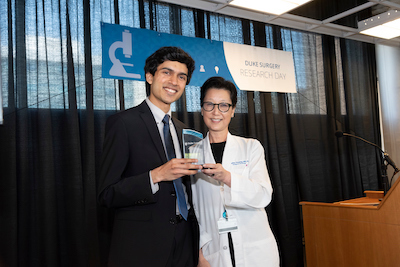
Machine Learning for Improved Size Matching in Lung Transplantation
Neel K. Prabhu
Mentor: Matthew G. Hartwig, MD
Basic Research
Inducing tolerance of HLA-mismatched Kidney Transplants Following Donor Derived Apoptotic Cell Infusion in Non-Human Primates
Chloe Nobuhara, Brian Shaw, Irma Hussain, Angil Danghi, Miriam Manook, Jeffrey Ord, Dimitrios Moris, Robin Schmitz, Kyha Williams, Xunrong Luo, Allan Kirk
Clinical Research
Machine Learning for Urodynamic Detection of Detrusor Overactivity
K. Tyler Hobbs, MD; Nathaniel Choe, Leonid Aksenov, MD; Lourdes Reyes; Wilkins Aquino, PhD; Jonathan C. Routh, MD, MPH; James A. Hokanson, PhD
Basic Research
Targeting S1P1 Internalization Avoids T cell Sequestration and Provides a Novel Immunotherapeutic Approach to Intracranial Tumors
Cosette DeChant, Pakawat Chongsathidkiet, Lindsey Rein, Alem Kahsai, Xiuyu Cui, Michelle Yang, Daniel Wilkinson, Robert Lefkowitz, and Peter Fecci.
Damage- and Pathogen-Associated Molecular Patterns Play Differential Roles in Late Mortality After Critical Illness
John Eppensteiner, Jean Kwun, Uwe Scheuermann, Andrew Barbas, Alexander T. Limkakeng, Eric Elster, Allan D. Kirk, Jaewoo Lee.
Clinical Research
A Mixed Method Implementation Analysis Assessing Barriers and Facilitators to Improving Safety Culture in a Pediatric Perioperative unit in Guatemala City
Isabelle Sico, Bria E. Johnston, Mónica Orozco, Angie Aguilar-González, Sindy Mendez Soveranis, Astrid Tello, Caroline Doherty, David Boyd, Joy Noel Baumgartner, Jennifer Headley, Kelsey Landrum, Randall Lou-Meda, and Henry E. Rice.
Basic Research
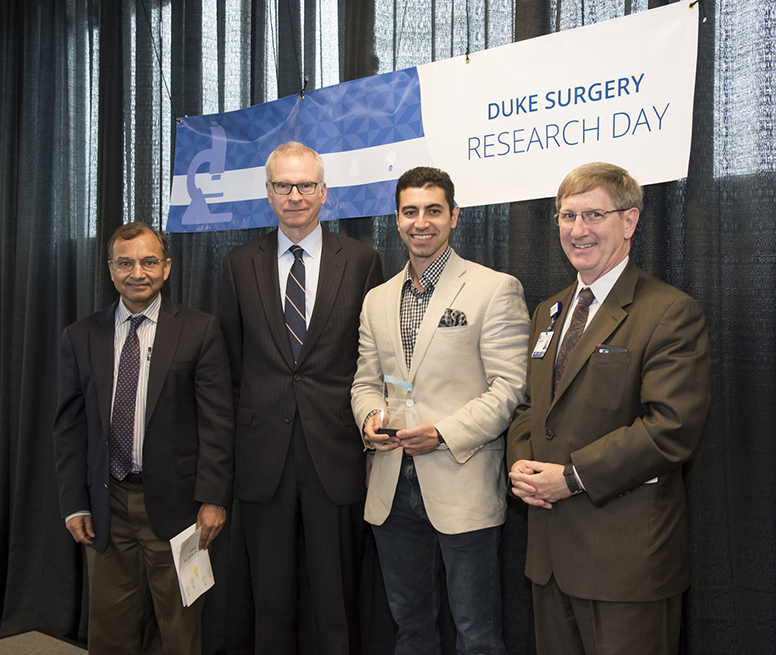
Implantable Oxygen Platform for Continuous, Real-Time Detection of Vascular Perfusion and Ischemia
Mohamed Ibrahim, Ryan Schweller, Mahmoud Mohamed, David Powers, and Bruce Klitzman
Clinical Research
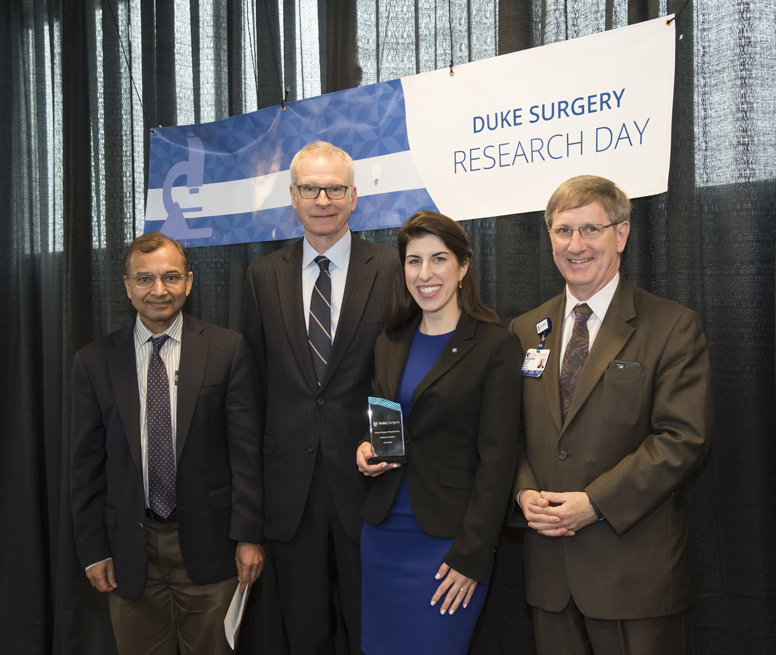
Just a Nudge: Applying Behavioral Incentives to Engage Residents in Quality Improvement Education
Ashley Wietsma, Eugene Cone, Johnathan Bergman, Tannaz Moin, Arlene Fink, Jonathan Routh, B. Price Kerfoot, and Charles Scales Jr.
Basic Research
Low-Dose Exposure to a Polycyclic Aromatic Hydrocarbon (PAH) Mixture Promotes Breast Cancer Cell Proliferation: A Model Using Creosote-Contaminated Sediment from a Superfund Site
Larisa M. Gearhart-Serna, John B. Davis, Scott J. Sauer, Nishad Jayasundara, Richard Di Giulio, and Gayathri R. Devi
Lymphoid Isolation as an Adjuvant Maneuver for Belatacept-Based Immunotherapy
Michael Mulvihill, Kannan Samy, Robert Patrick Davis, Francis Leopardi, Brad Collins, and Allan D. Kirk
Clinical Research
The Impact of Targeted HER-2 Therapy on Breast Reconstruction Outcomes: A Propensity-Matched Analysis
Ronnie L. Shammas, Eugenia H. Cho, Adam D. Glener, Luke P. Poveromo, Lily R. Mundy, Rachel A. Greenup, Kimberly L. Blackwell, and Scott T. Hollenbeck
Basic Research
Oncolytic Poliovirus Activates Antigen-Presenting Cells and Promotes Anti-Cancer Cytolytic Responses in Vitro
Michael Brown, Eda K. Holl, David Boczkowski, Darell D. Bigner, Matthias Gromeier, and Smita K. Nair
Clinical Research
Rethinking the Current AJCC Staging System for Medullary Thyroid Cancer: An Analysis of 3315 Patients
Mohamed Adam, Samantha Thomas, Sanziana Roman, and Julie A. Sosa
Hunter McGuire Sweaney Lectureship
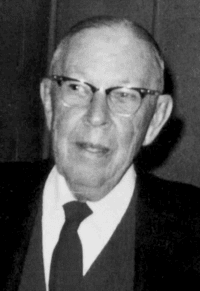
Hunter McGuire Sweaney, MD, was born in Berea, NC, in 1893. He received a Certificate of Medicine from the University of North Carolina School of Medicine in 1917, and his medical degree from the University of Pennsylvania in 1919. Dr. Sweaney joined the staff of Watts Hospital in Durham in 1919.
Dr. Sweaney held a general practice with his father, Dr. John Lockhart, along with Dr. John Moore Manning. He served as the Durham County Physician in 1922 and 1923, providing medical care to the residents of the county home for the indigent. In 1928, Dr. Sweaney limited his practice to general surgery after becoming a member of the American College of Surgeons. He became a surgeon for the Seaboard Airline Railways in 1934 and served as vice president, and was appointed as a surgeon for the U.S. Public Health Service Reserve in 1943. Dr. Sweaney founded the Durham Surgical Clinic with Dr. Jim Wilson, Dr. Isaac Harris Jr., and Dr. James Littlefield in 1953, retiring from the practice of general surgery in 1958.
Through his estate, Dr. Sweaney endowed a fund to establish the Hunter McGuire Sweaney Lectureship in Surgery to originally be shared by both the Duke University School of Medicine and the University of North Carolina School of Medicine.
Dr. Sweaney passed away on August 4, 1969. Herbert Bradshaw, editorial page editor, published a tribute to Dr. Sweaney in the Durham Morning Herald, describing him as “one of the most cultivated men in Durham...He knew art…he loved the classics, and he was at home in history, not merely the broad sweep of history but also in the intimate details. [He] loved the beauty of growing things, flowers, vegetables, and trees. Hunter Sweaney lived a full, rich, abundant, useful life. Success was his, merited by his industry and dedication, but he was ever the understanding friend, the kind neighbor, the pleasant companion.”